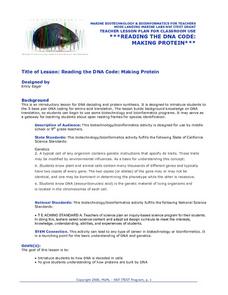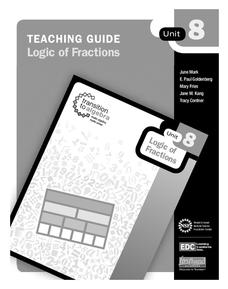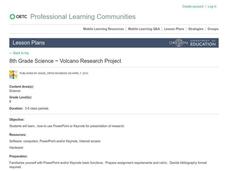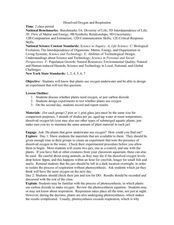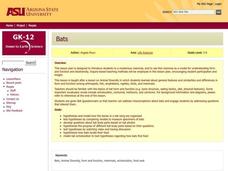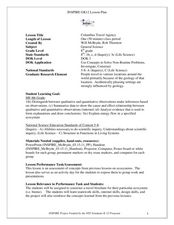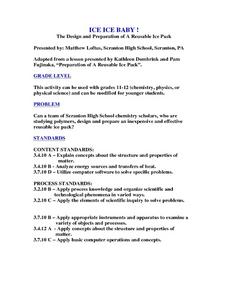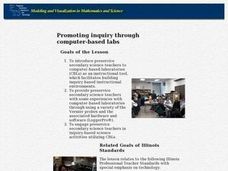Curated OER
Determine the molarity of an unknown HCl solution
Students complete a lab to help develop a comprehension of stiochiometry. They review equation writing, equation balancing, and stiochiometry. Studnets are given the following information: Sloppy students from the previous class have...
Curated OER
Let It Roll
Students experiment in order to see how ball bearings work. In this science activity lesson, students conduct an experiment where they make and examine a ball bearing. Students brainstorm other examples of ball bearings and discuss ways...
Curated OER
Survival in the Land of Batzilla
Young scholars experience a guided inquiry into the workings of an ultrasonic motion detector. They are led to study something they cannot see, hear, feel or taste. Students design strategies to avoid becoming prey of the predatory...
Great Books Foundation
Discussion Guide for Handmaid's Tale
Great literature discussions are a consequence of carefully crafted questions, interpretative questions that permit more than one response, and responses supported by specific evidence from the text. The discussion questions in a guide...
Curated OER
Reading the Dna Code: Making Protein
Students study DNA decoding and protein synthesis. They use the amino acid table to translate DNA, break DNA strands into three nucleotide codes, and translate nucleotides into amino acid protein codes. They research the importance of...
Education Development Center
Logic of Fractions
Before diving into operations with fractions, learners discover the foundation of fractions and how they interact with one another. Exactly as the title says, logic of fractions is the main goal of a resource that shows pupils how...
Education Development Center
Micro-Geography of the Number Line
Young mathematicians dive into the number line to discover decimals and how the numbers infinitely get smaller in between. They click the zoom button a few times and learn that the number line doesn't just stop at integers. Includes a...
Curated OER
The UPS Experiment
Students calculate the speed using metric measurements. In this geometry lesson, students calculate speed, distance and velocity using metric measurements. They gain inquiry and problem solving skills in this assignment.
Curated OER
Volcano Research Project
Eighth graders research about different types of volcanoes. In this earth science lesson, 8th graders create PowerPoint presentation on the information gathered. They share findings with the class.
Curated OER
Process Skills Review: Observation, Inference, and Predictions
A simple worksheet asks science learners to define five terms and identify five statements as predictions, observations, or inferences. This would be a supportive assignment when introducing elementary-levle scientist to inquiry practices.
Curated OER
The Earliest Primates
In this early primate worksheet, students will read information about the fossil evidence of the earliest primates. Students will complete 3 short answer questions based on their reading.
Curated OER
Build A Borneo Glider!
Young scholars construct a paper glider. In this physics of gliding lesson, students first learn about Borneo and it's rainforest habitat. After young scholars discover the way animals in Borneo glide from tree to tree, they use their...
Achieve
Rabbit Food
Keep your pets slim, trim, and healthy using mathematics! Pupils use a linear programming model to optimize the amount and type of food to provide to a pet rabbit. They model constraints by graphing inequalities and use them to analyze a...
Curated OER
Problem Based Inquiry Learning
Tenth graders research Nuclear Energy and Radioactivity, how is this form of energy used for the good of mankind in solving the energy crisis and the hazardous aspect of using this form of energy. They cooperatively work in groups to...
Curated OER
Dissolved Oxygen and Respiration
Students are presented with the question, "Do plants that grow underwater use oxygen?" They create an experiment to test the presence of dissolved oxygen in the water using provided materials. Student experiments include a control jar as...
Curated OER
Tides in the Hudson
Students view an illustration of the Hudson River watershed and identify the bodies of water shown. They discuss what happens when fresh and salt water mix. Students view a teacher demonstration of the stratification of fresh and salt...
Curated OER
Change Since 1609
Students recognize how the climate of the Hudson Valley has changed since the last glaciation. They explain these changes using a reconstruction of the land use changes in the Hudson Valley composed of confetti, Ziploc bags and other...
Curated OER
Paleoclimate of the Hudson Valley
Students recognize how the climate of the Hudson Valley has changed since the last glaciation and be able to explain these changes. They reconstruct the paleoclimate of the Hudson Valley.
Curated OER
Bats
Students model how the bones in a bat wing are organized. They develop questions about bat body parts based on photographs. They hypothesize how bats locate their food.
Curated OER
Columbus Travel Agency
Eighth graders research about their chosen ecosystem. In this life science lesson, 8th graders play the role of travel agents and create a travel brochure. They share this in class.
Curated OER
Ice Ice Baby! The Design and Preparation of A Reusable Ice Pack
Students explore polymers by designing and preparing an inexpensive and effective reusable ice pack. They develop and test a design for a reusable ice pack in the science lab. Students apply chemical and physical properties of polymers...
Curated OER
Promoting Inquiry Throught Computer-Based Labs
Student Teachers are given the opportunity to examine how to use a computer-based laboratory for inquiry. The practice is done to teach future teachers how to use these tools so they can be ready for use in the classroom environment.
Curated OER
Rock Identification Lab
Eighth graders compare and contrast the three different types of rock. In this earth science lesson, 8th graders classify rock samples according to their correct rock type. They design their own data collection table.
Science 4 Inquiry
Carbon and Climate
The carbon cycle is natural and has happened for millions of years, so can humans change it? Young scientists play the role of carbon as they travel through the carbon cycle. They complete two rounds, once before the industrial...
Other popular searches
- Inquiry Based Science Lessons
- Inquiry Based Science Water
- Science Inquiry Based
- Inquiry Based Science Lessons
- Inquiry Based Science Sose
- Inquiry Based Science Souse
- Science Inquiry Based Learning






